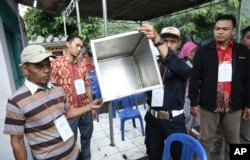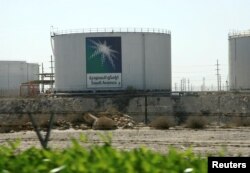King Salman's extravagant travel arrangements have captured the public imagination ahead of the Saudi monarch's high-profile visit to Indonesia beginning Wednesday, but billions of dollars in oil and other investment deals are also at stake.
The trade deals could be worth as much as $25 billion, including a $6 billion project between the two nation's oil companies, according to Indonesian officials who briefed reporters on the scheduled talks between Salman and Indonesian President Joko "Jokowi" Widodo.
Matters of faith will also figure prominently in the encounter between the world's richest and its most populous Muslim nation. But it has been lost on no one that the king and his massive entourage are expected to spend most of the nine-day sojourn vacationing on Bali.
The Associated Press reported 1,500 officials, princes and businessmen are accompanying the king on the visit, the first to Indonesia by a Saudi monarch since 1970.
Air freight provider PT Jasa Angkasa Semestra said it was handling 459 tons of cargo for the entourage, including two Mercedes-Benz S600s. In Bali, the king will have at least 100 security personnel from Saudi Arabia, along with a special team to safely prepare his halal food, according to local press reports.
"This will be a VVIP security operation that will be jointly conducted with the military," said Bali police spokesman Hengky Widjaja.
Jakarta governor's race
But that focus on how the rich are different draws attention from the timing of the visit. It comes as the closely watched election for governor of Jakarta heads into a tight runoff between the minority Christian incumbent, Governor Basuki "Ahok" Tjahaja Purnama — whose campaign was hurt by blasphemy charges — and Anies Rasyid Baswedan, a former education minister who courted conservative and hard-line Muslims.
Violence and protests overshadowed campaigning before the first round of voting in mid-February, and there are fears of worse before voters return to the polls in April.
Objections to Purnama's Chinese ethnicity and allegations that he insulted the Quran dominated the earlier campaign, transforming the contest into a high-stakes fight between moderates and conservatives, who want Islam to be ascendant in politics and society.
The "Islamic factor" is expected to play a key role in the outcome, and even though Salman's visit was planned before the issue arose, his presence may be a reminder of the influence Saudi money is playing in nudging Indonesia toward a stricter version of Islam.
As VOA reported in January, generous Saudi scholarships for Indonesians to study in the kingdom have since 1980 been spreading Salafism, Saudi Arabia's strict form of Islam, in Indonesia. Its believers want Islamic laws as defined by the Quran to be the law of the land.
During his visit, Salman will perform Friday prayers at Jakarta's Istiqlal Mosque and meet with leaders of Indonesia's largest Muslim organizations. The two leaders are also expected to sign an agreement on "the promotion of moderate Islam through preaching and the exchange of scholars," according to Indonesia's Foreign Ministry.
Energy deals expected
Indonesia's Ministry of Energy and Mineral Resources told VOA the two nations are expected to sign energy sector agreements during the visit. One of them meets Indonesia's request to be recognized as a preferred nation for Saudi oil, which would entitle it to a discount price on oil imports of 110,000 barrels per day of Arabian light crude.
Indonesia is also exploring an agreement to import liquefied petroleum gas from Saudi Arabia, and Saudi Aramco is expected to invest in upgrading several refineries of the Indonesian oil company Pertamina.
"The investment value of each refinery upgrading project amounts to US $5.4 to 6 billion," Sujatmiko, communications chief for the Ministry of Energy and Mineral Resources, said Monday.
Arrmanatha Nasir, spokesman for Indonesia's Foreign Ministry, said that in addition to energy, "Saudi Arabia is also interested to invest in infrastructure development in Indonesia, such as roads, water supply, housing and so forth. … This is something that we want to develop and certainly would be the main focus of the discussions between the two heads of state."
Five memorandums of understanding are ready to be signed by representatives of the two governments, according to Nasir. He said they call for cooperation on cultural issues, health, Islamic affairs, air travel and global crime.
VOA's Indonesia service contributed to this report.






